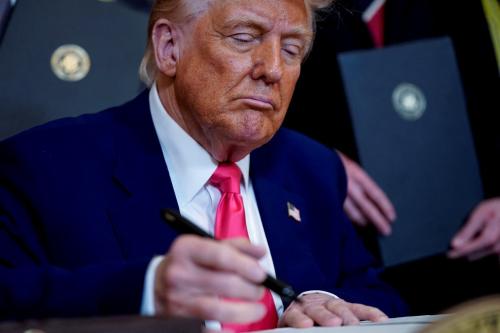In his recent inaugural address, President Obama promised that “we will respond to the threat of climate change, knowing that the failure to do so would betray our children and future generations. Some may still deny the overwhelming judgment of science, but none can avoid the devastating impact of raging fires, and crippling drought, and more powerful storms. The path towards sustainable energy sources will be long and sometimes difficult. But America cannot resist this transition; we must lead it. We cannot cede to other nations the technology that will power new jobs and new industries – we must claim its promise. That is how we will maintain our economic vitality and our national treasure – our forests and waterways; our croplands and snowcapped peaks. That is how we will preserve our planet…” When pressed on the specifics of what the president means to do on climate, his spokesperson replied: “We have not proposed and have no intention of proposing a carbon tax.”
The president has a problem, and he’s not alone. Many policymakers who are compelled by the consensus of scientists on the risk of global climate disruption seem willfully oblivious to the peer-reviewed economic research on what to do about it. Indeed, they completely ignore the remarkable consensus of economists – a group that often isn’t unanimous on important policy options, as memorialized by President Harry Truman’s famous request for a “one-armed economist.” In this case, though, economists nearly universally agree that, while basic energy research and development remain an important role of government, a price on carbon would minimize the cost of steering economic activity away from the greenhouse gas emissions that threaten the climate. Disagreements can and do arise around the details, such the appropriate level of the carbon price signal and the relative merits of various flavors of the carbon taxes and cap-and-trade programs that could impose it. Nonetheless, there’s as close to a universal consensus among economists as there is on any topic that pricing carbon should be a central feature of climate policy worldwide.
In fact, in a survey of about 40 prominent economists from across the profession, 90% agreed with this statement: “A tax on the carbon content of fuels would be a less expensive way to reduce carbon-dioxide emissions than would a collection of policies such as ‘corporate average fuel economy’ requirements for automobiles.”[1] When weighted by the level confidence the respondents had in their answers, the agreement rose to 95%.
Another survey of the same prominent economists referred to a Brookings Institution description of a U.S. carbon tax of $20 per ton, increasing at 4% per year, which would raise an estimated $150 billion per year in federal revenues over the next decade.[2] A remarkable 98% of the surveyed economists, again weighted by confidence, agreed with this statement: “Given the negative externalities created by carbon dioxide emissions, a federal carbon tax at this rate would involve fewer harmful net distortions to the U.S. economy than a tax increase that generated the same revenue by raising marginal tax rates on labor income across the board.”[3] In other words, using a carbon tax to reduce the budget deficit or reduce other, more burdensome, taxes makes all the economic sense in the world.
For example, consider an excise tax on the carbon content of fossil fuels, imposed where they enter the economy. If it starts next year at just $16 per ton of CO2 (the equivalent of about $0.16 per gallon of gasoline) and rises at 4% per year over inflation, it would bring in enough revenue over the next ten years to reduce the marginal U.S. corporate income tax rate from a near-global high of 35% to 28%, preserve $115 billion in safety net spending for the poorest households, and still reduce the federal budget deficit by $200 billion over the decade. Such a tax would also reduce emissions by over a third by mid-century.[4] This pro-growth, pro-environment strategy would also obviate more costly regulations, subsidies, and mandates to reduce emissions and give the United States standing to call for equivalent measures abroad.
Notwithstanding the president’s speech, economists are highly skeptical that clean energy subsidies and mandates will create jobs on net over the long run. New technology that involves more jobs than the technology it replaces is likely to be more expensive. So in the absence of a tax on carbon emissions, cleaner alternatives to fossil fuels will require persistent federal subsidies, money that has to come from somewhere. And even if energy technologies become export strengths of the United States, international trade tends to reallocate rather than add or subtract overall jobs in the economy. The real reason to care about clean energy is that it’s clean. A carbon tax naturally promotes the cleanest and cheapest technologies so they don’t need a subsidy to compete.
In his State of the Union speech, the president will likely confirm his intention to issue Clean Air Act regulations to control greenhouse gas emissions from existing power plants, and he’ll probably promote the latest tax credits for clean energy manufacturers. I hope the president uses these inefficient approaches to prompt new authority from Congress to tax carbon and to use the proceeds to reform our creaky corporate tax system, protect the poor, and reduce the deficit that also risks betraying our children.
The president and others should recognize the strong consensus of experts whose life’s work is to understand markets: the best way to reduce greenhouse gas emissions is through a permanent and predictable price on carbon and responsible management of the revenue. Policymakers globally should not deny the overwhelming judgment of economists, even as they respect the overwhelming judgment of climate scientists. On this issue, we’re nearly all one-handed.
[1] http://www.igmchicago.org/igm-economic-experts-panel/poll-results?SurveyID=SV_9Rezb430SESUA4Y
[2] The Brookings paper is here (https://www.brookings.edu/research/papers/2012/11/13-carbon-tax), and its numbers derive from the MIT study here (http://globalchange.mit.edu/research/publications/2328).
[3] http://www.igmchicago.org/igm-economic-experts-panel/poll-results?SurveyID=SV_8oABK2TolkGluV7
[4] My colleagues Warwick McKibbin and Pete Wilcoxen and I analyze a similar policy here: https://www.brookings.edu/research/papers/2012/07/carbon-tax-mckibbin-morris-wilcoxen.
The Brookings Institution is committed to quality, independence, and impact.
We are supported by a diverse array of funders. In line with our values and policies, each Brookings publication represents the sole views of its author(s).



Commentary
Want a Pro-Growth Pro-Environment Plan? Economists Agree: Tax Carbon.
February 7, 2013